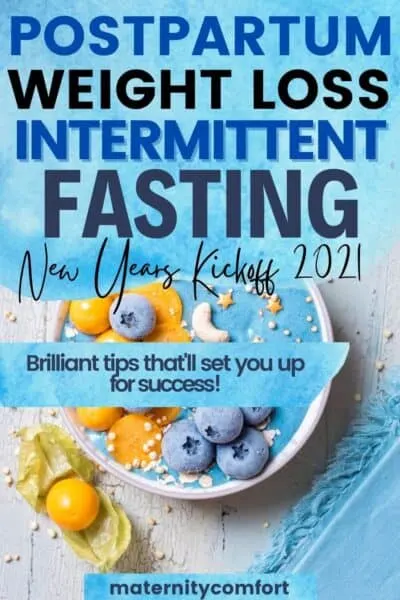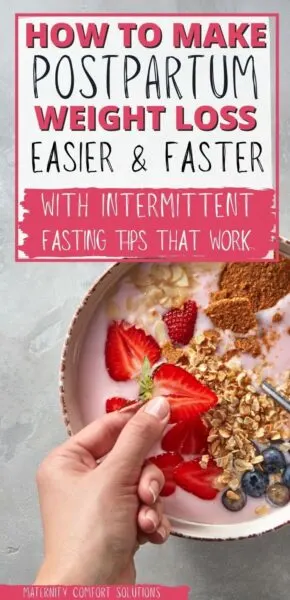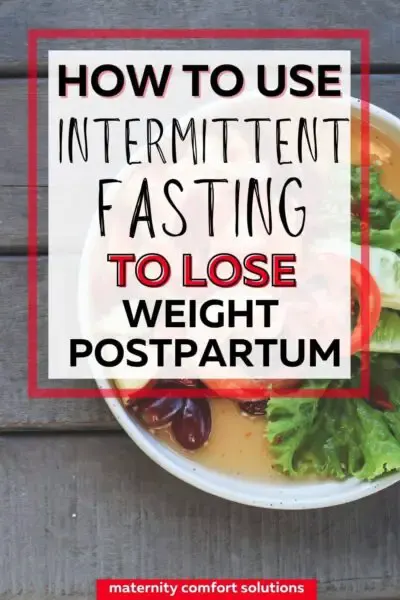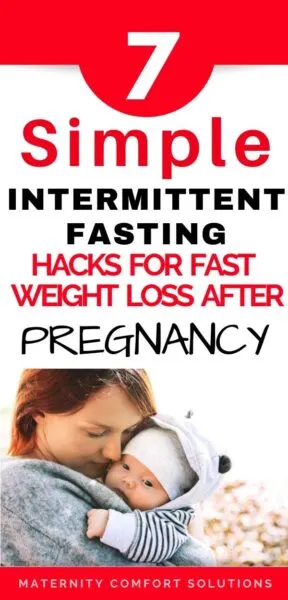Updated February 5, 2023
Are you frustrated with losing weight postpartum?
You are not alone.
Intermittent fasting is a popular diet plan that can help you lose the baby weight quickly.
The plan generally has you fasting for 16-18 hours and eating in a 6-8 hour window.
There are several ways intermittent fasting can be done, but the 16/8 is the one I have used and is the most popular.
Intermittent fasting postpartum

Intermittent fasting should not make you feel miserable.
We have found the key to success with intermittent fasting is making healthy food choices when you are not fasting
7 Intermittent Fasting Hacks for Losing The Baby Weight:
1. Choose the right fasting hours.
Choose your intermittent fasting hours based on what works best for you.
This is so important.
You know your hunger patterns best.
Let’s say you decide to do 16 hours of fasting and plan to eat within an 8-hour window. This is probably the most common one and the one I like to use. What I do is fast from 7 PM to 11 AM. That works best for me.
We either run or walk several miles in the morning so I’m rarely hungry before 11 AM.
Your hours may vary from that. Figuring out the right fasting hours for you helps set you up for success.
The right intermittent fasting schedule can make or break your success.
If you are unsure you can try different fasting times until you find one that works for you.
2. Make healthy food choices.
The temptation after fasting for upwards of 16 hours AND taking care of a new baby is to reach for less healthy options.
The craving for fast food and comfort food can really take over and make it harder to make healthy choices so you will lose the baby weight.
You want to try to focus on more whole foods and complex carbs, this will help you stay full longer, keep your blood sugar more stable and reduce your cravings.

Photo Credit: Maternity Comfort Solutions.
You have to find the balance that is right for you to lose the baby weight.
If you find cutting your carbs and adding more protein and fats boosts your energy level and cuts your cravings, you should do that.
You may find the ketogenic diet works really well for you.
If you are breastfeeding and considering a keto diet, you’ll want to discuss this with your provider to be sure your newborn is getting all the necessary supplements.
The keto diet is definitely not for any woman who is pregnant or planning a pregnancy, as birth defects are clearly associated with nutritional deficiencies.
There are two things you will want to invest in that will seriously help you to lose weight… a slow cooker and an instant pot.
They both make cooking with a new baby so much easier whether or not you choose to go on an intermittent fasting diet!
No more rushing around at 5:30 PM wearing your colicky, unhappy baby, trying to figure out dinner.
The instant pot easily cooks frozen meat which comes out fork-tender! You can even prepare tons of healthy freezer meals before the baby comes to make losing the baby weight even easier.
Some of my favorite postpartum weight-loss-friendly recipes are below:
- Baked Spaghetti Squash And Cheese – Skinnytaste
- Honey Lime Chicken – RasaMalaysia
- Avocado Toast 12 Ways – Fannetastic
- Low Carb Chicken Enchilada Casserole – 730 Sage Street
- Chicken Alfredo Spaghetti Squash – The Gunny Sack
- Healthy Baked Chicken Parmesan – Organize Yourself Skinny
- Slow Cooker Salsa Chicken with Black Beans and Corn – Skinnytaste
- Instant Pot Chicken Cacciatore – Skinnytaste
- Spinach Lasagna Rolls – Skinnytaste
Spinach Lasagna Rolls

3. Stay hydrated with water.
Staying well-hydrated is an important key to any weight loss plan.
Water is the best choice, though it is important to occasionally drink electrolyte-enriched products to maintain a healthy balance of sodium, chloride, and potassium.
If you are breastfeeding and intermittent fasting staying well hydrated is critical.
One of the most common causes of low milk supply is dehydration.
An adult should drink 64 ounces of water each day (eight 8-ounce glasses).
While breastfeeding you should drink an extra quart, or an extra 32 ounces each day.
If you are doing 16/8 intermittent fasting while breastfeeding you need to be drinking plenty of water.
Try to avoid consuming diet drinks and drinks made with artificial sweeteners.
Some studies have shown a potential link between artificial sweeteners and an increased appetite and over-consumption. (Source)
You can add fruits and herbs like mint to your water for variety!
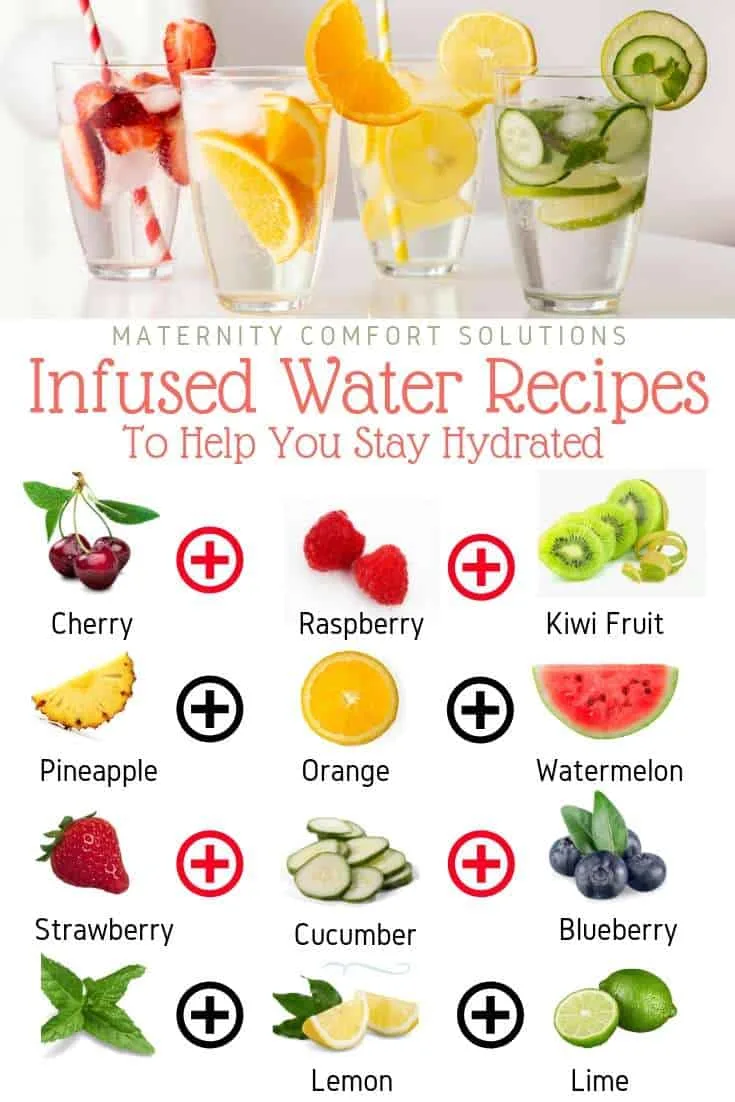
4. Get more sleep.
Easier said than done with a new baby! I feel you on that, but getting more sleep is definitely associated with more compliance with a weight loss plan and better weight loss results. (Source)
If you can’t get more sleep, at least try to get better quality sleep. Some sleep tips you might find helpful include:
- Taking a warm bath before bed – This is a proven technique to help you relax and get your mind/body ready for sleep. As new moms, we struggle to make time to focus on ourselves. Make it a habit from the beginning to schedule “me” time, and make it a priority, even if it is only a 15-minute bath at night before bed. Dim the lights, light a scented candle, play the music you love and chill for a few minutes.
- Keep your bedroom cooler – Try keeping your room in the lower 60s for sleeping. Most people find this the perfect temp to get a good night’s sleep.
- Use a body pillow – A body pillow can help increase your comfort in bed and make sleeping easier. Recovering from childbirth is no joke and taking care of yourself is so important! If you don’t have one consider investing in a body pillow to help you heal quicker physically and emotionally. The “power of sleep” is underestimated, make the best of your sleep time. Also, consider reading our articles about left-sided sleep and the various types of sleep pillows available.
5. Exercise
Squeeze in exercise when you can.
Losing weight is not all about what goes on in the kitchen.
This being said, don’t try over do it in the exercise department with a new baby.
There is no need, but exercise can help increase your calorie deficit, improve your mood, and it is good for your heart.
Make sure you get cleared by your healthcare provider before you start exercising.
The goal is to move more and eat less.
Some exercise options to consider:
- Walking – Put your baby in a stroller and walk around the neighborhood. If you can only handle once around the block that’s OK! If you can’t get outdoors yet, there are amazing sets of walk-at-home videos on youtube. I use them during the day while I’m working if I need a break and need to move around. My favorite is Leslie Sansone. You can do it while your baby naps, is in the swing, or while babywearing. This exercise is low impact, doesn’t require any fancy equipment, and is easy to follow. Do what works for you always remembering that your efforts are to lose the baby weight fast.
- Swimming – Swimming is a great low-impact exercise and can burn a lot of calories. You might want to consider joining a baby and mommy swim class if you have one available in your local area.
- Yoga – Yoga is an excellent choice as well. It can be done at home, it burns calories, improves mood and you can easily fit it into your schedule. (Yoga, as is the case with any exercise program, must be cleared with your prenatal care provider).
If you are an Amazon Prime member you will find beginning yoga for weight loss videos available to stream on-demand on your TV.
The one I like the most is Weight Loss Yoga Workout for Beginners with Erica Vetra. If you are new to yoga I would suggest you get a yoga mat you like, a set of yoga blocks (which really helps with poses in the beginning), and a yoga strap.
I use an infinity strap and I think they are the very best for helping to increase flexibility and range of motion.
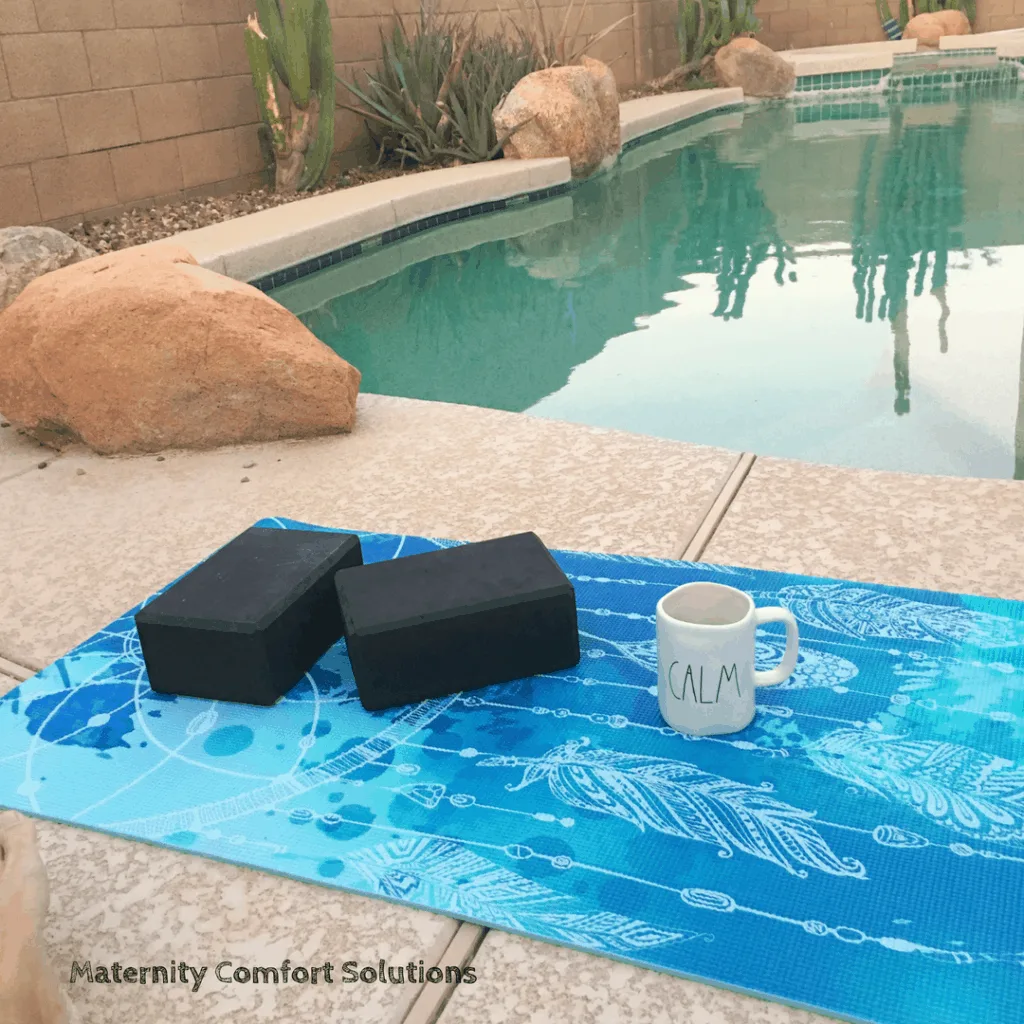
6. Don’t stress about postpartum weight loss.
Stress is a diet destroyer.
It can lead to increased cravings, make you make unhealthy choices, and cause you to overeat.
Having a new baby is stressful enough, so don’t put too much pressure on yourself to lose the baby weight.
The weight will come off, just focus on keeping your stress level under control.
Relaxation Techniques can help you lower your stress level:
- Breathing exercises – Inhale through your nose for a count of 4, hold for a count of 7, and exhale through your mouth for a count of 8.
- Guided imagery/meditation – Using guided imagery and meditation can help you feel calmer and more centered. When you feel at peace and in control, it is much easier to stick with intermittent fasting and the many other demands placed on you during the postpartum period.
7. Watch out for boredom.
Boredom is a diet destroyer when I am trying to lose weight and can lead to snacking.
You may find that it is true for you too. So stay busy.
I know with a new baby, you are ALWAYS busy, but cherish those precious moments of mom-time.
Remember when fasting: No food during fasting hours. Zero. None. Nothing.
So you will need to have ways to stay busy and avoid getting bored.
Boredom and snacking are a combination that can completely sabotage your weight loss efforts.
I have found that the best way for me to follow up on my fasting interval, is to eat a meal higher in protein and lower in carbs.
If I eat too many carbs at my brunch/lunch, I’m dragging the whole afternoon. You do what works best for you, but if you find you get tired after your first meal, decreasing the carbs might help.
This is a typical brunch/lunch meal (pictured below).
It is scrambled eggs with cheese, arugula, and tomatoes. Easy and simple to make and will help you stick to your diet plan to lose the baby weight.
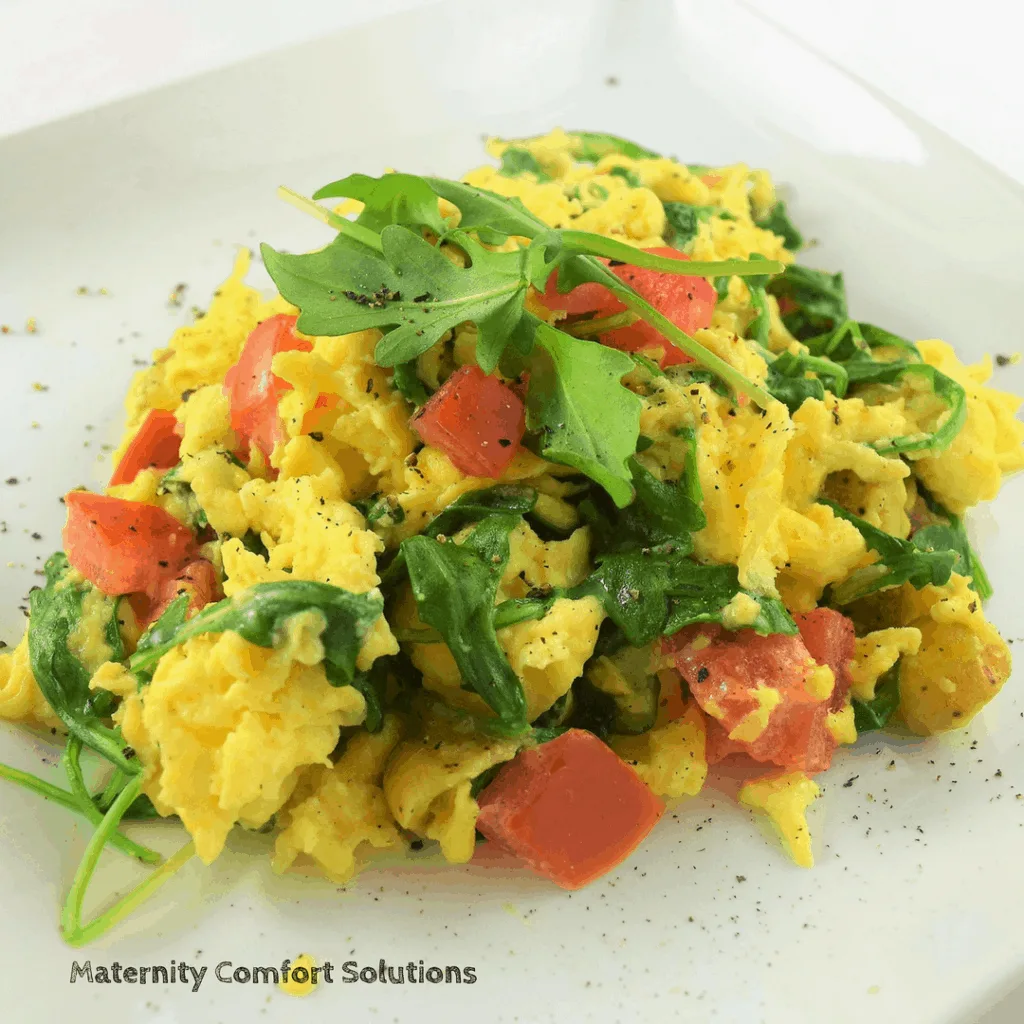
Intermittent fasting is a growing and popular weight loss plan that can help you lose the weight you gained during pregnancy quickly.
It doesn’t need to and should not make you feel miserable.
So make sure you adapt the diet to your needs and what works best for you.
Is intermittent fasting good for postpartum?
Yes, intermittent fasting is good and safe for postpartum weightloss.
Intermittent fasting can help you lose weight quickly without leaving you feeling starving and deprived.
It may help improve your energy level and help you sleep better.
Does intermittent fasting reduce milk supply?
It can, but it doesn’t have to!
The key is to stay well-hydrated during your fasting hours and to eat enough calories in your eating window.
Breastfeeding women need an increase of about 500 calories a day to maintain a good milk supply.
Finding the right balance between fasting, eating, and fluid intake is important.
And there is not a once size fits all answer.
Our OB/GYN Dr.Doug Penta, MD said if you are going to practice intermittent fasting postpartum and are breastfeeding drinking adequate fluids, breastfeeding/pumping more often, and eating enough are critical to maintaining your milk supply.
Avoid intermitted fasting schedules that would only have you eating one meal a day while breastfeeding.
You should be eating two to three meals a day while breastfeeding and intermittent fasting.
Other articles you might like:
Do not go on a diet while pregnant or planning pregnancy. Nutritional deficiencies can cause birth defects.

